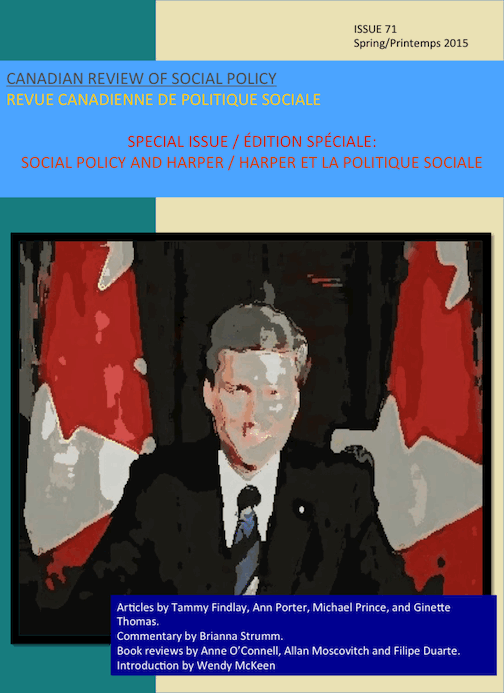Prime Minister as Moral Crusader: Stephen Harper's Punitive Turn in Social Policy-making
Keywords:
Federal social policy, moral conservatism, political science, Law and orderAbstract
Stephen Harper has been Canada’s Prime Minister since 2006, heading three Conservative administrations; two minority governments (2006-08, and 2008-11) and one majority government (2011- to the present). Harper’s time in power has spanned periods of economic growth and surplus federal budgets, through a deep economic recession and budget deficits, to a tentative recovery of the Canadian economy and federal program of general fiscal restraint. Throughout this period of shifting economic and political circumstances, Harper, an intensely partisan and disciplined politician, has dominated his cabinet and parliamentary party as well as defined federal social policy and intergovernmental relations in particular ways. Like other Prime Ministers and governments, the Harper era exhibits a mixed pattern of social policy-making. Thus, although there are certain similarities in policies with previous federal administrations led by Liberal Prime Ministers, Harper’s social policy is distinctive as well. This article advances the argument that Harper’s characteristic approach can be understood in terms of an institutional-punitive conception of social policy. This stern approach to federal social policy-making involves the identification of dangerous persons and threatening behaviours, the elaboration of laws and creation of new offences, and the intensification of legal penalties and punishments. What emerges is the role of Prime Minister as moral crusader in a politics of fear, judgement and regulation. Stephen Harper est le premier ministre du Canada depuis 2006, et il a dirigé trois administrations conservatrices: deux gouvernements minoritaires de 2006-2008, et de 2008-2011, et un gouvernement majoritaire de 2011 à aujourd’hui. Ces administrations ont connues des périodes de croissance économique et de budgets fédéraux excédentaires, ainsi qu’une profonde récession économique, pour arriver enfin à une relance incertaine de l’économie canadienne et à un programme général fédéral de contraintes budgétaires. Harper est un politicien éminemment partisan et très discipliné, et il a dominé son cabinet ainsi que son parti parlementaire au cours de cette période de conditions économiques et politiques changeantes. Il a également redéfini la politique sociale fédérale et les relations intergouvernementales de manière spécifique. Comme d’autres premiers ministres et gouvernements auparavant, l’ère de Harper fait montre d’un mélange de motifs de politiques et de gestion sociales. Donc, bien qu’il existe de similarités en politiques sociales avec les administrations fédérales libérales qui l’ont précédée, la politique social de Harper est très distincte et cet article propose donc que l’approche caractéristique à Harper peut être définie comme une politique sociale institutionnelle-punitive. Cette approche sévère a propos des politiques sociales fédérales, incorpore un processus d’identification de personnes dangereuses et de omportements menaçants, la création de nouvelle lois et de nouveaux délits pour les contrôler, et, l’augmentation des sanctions et peines légales. Le rôle du premier ministre émerge donc comme celui d’un champion de la moralité, aidée par une politique de peur, de jugement et de règlementation. Mots-clefs: politique sociale fédérales; conservatisme moral; sciences politiques.Downloads
Published
How to Cite
Issue
Section
License
1-The author guarantees that the manuscript is an original work not published elsewhere in print or electronically in whole or in part, except in abstract form, that the author has the full power to make this contribution, and that the manuscript contains no matter libelous or otherwise unlawful or which invades the right of privacy or which infringes any proprietary right.
2-The author guarantees that the manuscript has not been previously published in print or electronically and that if the manuscript contains any tables, figures or images fully reproduced or closely adapted from previously published material, the author must obtain the necessary permission from the author/publisher holding the original copyright prior to publication in CRSP. The author may be required to produce evidence of permission granted to CRSP’s editors.
3-As a condition of publication in CRSP, the author assigns all copyright to CRSP, including but not limited to the right to publish, republish, and otherwise distribute this manuscript in print, electronic, or other formats. As CRSP is a non-profit interdisciplinary scholarly journal, the author will receive no royalty or other monetary compensation for the assignment set forth in this agreement.
For the purpose of full disclosure, CRSP will not normally use the content provided by the author in a commercial venture, but for the purpose of disseminating the author’s content to as many readers as possible. For distribution, third parties engaging in commercial activities may be contracted to distribute the content globally, and such parties may make a profit out of the author’s content in their normal course of business. CRSP will not pay the author or reimburse the author in any form based on such commercial activities because the conduct of such commercial activities is outside the control of CRSP.
Any future reference to or use of this published material by the authors must acknowledge CRSP as the original place of publication.
PERMISSION REQUEST/ARCHIVING
Permission is given to author(s) receiving funding via Tri-Council Agencies, the Canadian Institutes of Health Research (CIHR), the Natural Sciences and Engineering Research Council of Canada (NSERC) and the Social Sciences and Humanities Research Council (SSHRC), to make their publications freely available in an Open Access repository within the stated deadline by the Tri-Council Agencies (12 months following publication). Archiving of publication must be a manuscript copy bearing none of the CRSP headers, footers or any other distinguishing marks. No links to the article on the CRSP website is permitted.
Permission requests from third parties to reproduce articles in part or full in academic/educational publications can be directed to the managing editor of CRSP, and will not be unreasonably denied.

